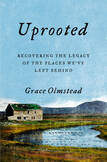Review: Making a home in a time of alienation
We shop for a place to live the way we shop for cars. We would like a place with good schools, easy access to nature and good restaurants. We might want a place where there are people like us, where we don’t have to deal with annoying politics unlike our own.
When we think about making a home only in these terms, we risk turning home into a commodity, a consumer good, and the result is that we treat the places we live the way consumers do, and not as members of a community.
In her new book, Uprooted, Grace Olmstead investigates the social and personal costs of this pattern, which has so many people leaving where they grew up and going to a handful of major cities and their suburbs. For individuals, the result is often alienation. For the places they leave behind, it is often stagnation or decay. Olmstead does an admirable job interrogating those costs, and the book serves as one of the best introductions I have read to the problems that face the rural United States right now.
We treat the places we live the way consumers do, and not as members of a community.
At the same time, it is a substantive analysis, of the type familiar to readers of Wendell Berry, of the cultural trends that lie beneath these problems. These are challenges that involve all of us, rural and urban, in both material and spiritual ways.
Olmstead herself is one of those people who left home. She comes from the small town of Emmett, Ida., but has lived for the past decade or so in the vicinity of Washington, D.C. The book is born out of the tension between her own desire for roots and the fact that she has uprooted herself from the place that made her. It is an exercise in discernment that asks what many of us who have moved to big cities have asked: Should I go back?
In answering her central question, Olmstead makes an effort to look at her hometown from every angle. Beginning with history, she displays the honesty that is typical of her exploration. In her telling, the origin story of Emmett is a tale of hardworking immigrants with a pioneer spirit, but it is also a story of the exploitation of Chinese laborers, the exclusion of free Blacks and violence against American Indians. It would be easy to take one portion of this narrative and call it the whole story, but Olmstead insists on the whole picture and looks for the good in the midst of brokenness.
Olmstead makes use of the writer Wallace Stegner’s distinction between “boomers” and “stickers.”
This is seen in the life of Grandpa Dad, Olmstead’s great-grandfather and a presiding spirit in the book. He is not a perfect character. He is a bit stubborn and too self-reliant, but he stood against destructive and “deliberate choices to maximize profit, rather than embrace limits, to prioritize ‘progress’ over rootedness.” It is precisely this ruthless pursuit of profit, Olmstead argues, that has depleted the soils, sullied the waterways and deprived small towns of their community life.
Olmstead deftly explains the forces of globalization and consolidation that accounts for these changes. Farms have grown more industrial in order to serve global commodity markets; manufacturing has moved overseas; and the knowledge economy has aggregated in a small number of cities. What is left in the rest of the country is the population of those who do the backbreaking labor to bring cheap consumer goods to the city, those without the means to leave, and those with the grit, heart and dedication to stay. The pattern has become one of exploitation, where rural areas serve the city by delivering essential goods but are often left out of the full benefit of that economic output.
In contrasting the attitude of exploitation with the attitude of responsibility, Olmstead makes use of the writer Wallace Stegner’s distinction between “boomers” and “stickers.” Stickers are those who give themselves deeply to a place; boomers are those who take what they can from a place and leave. Olmstead’s great-grandfather was the “consummate sticker,” whose habits were so reliable he had “worn tracks in the farmhouse’s green carpet.” Notably, he lived in a time when it was easier to pick up stakes and move than it is now; his life was a conscious choice to stand against exploitation and to embrace the mindset of a caretaker.
Grandpa Dad stands as a solution to our own alienation and to the struggles that face so many of our towns: rootedness. But to be rooted does not mean to have one’s family stay in a place forever; rather it is, as Olmstead writes, to be “members” of one another’s lives, to be “responsible and accountable” for our neighbors. This is something that comes only with time and commitment, something that grows organically through shared life, shared labor and shared suffering. The economic and cultural trends of the last 100 years, however, have made this kind of life harder than ever.
“The American Dream is, in essence, about economic and class transience,” Olmstead writes, and often enough this has meant a geographic transience required by the search for better material welfare. That is not all bad, unless it means never putting down roots and instead making the acquisition of money the highest value. That side of the American Dream may indeed be a dangerous one.
To be truly at home requires loving and giving ourselves to a place for its own sake.
But in all the criticism of American greed, it can sometimes be forgotten that there is another, equally American way of living that embraces limits and responsibility over the chase for wealth. I felt myself wishing that Olmstead had identified this more strongly as authentically American.
In the end, Olmstead seems to conclude that she really ought to return to Idaho, to plant herself among her family and give herself to the place that gave itself to her. To do this takes, she rightly notes, not mere nostalgia, but a “conscious choice of love, made to a people and place that are messy, complicated, broken and precious.”
There is not one right answer for everyone; there can be good reasons to move and settle somewhere new. The truth is, even those of us who stay in one place may not really be rooted. Rootedness is not just about being somewhere for a long time, it is about entering into a deep relationship with (and taking responsibility for) the land, the history and the people that make a place what it is. To be truly at home requires loving and giving ourselves to a place for its own sake.
This book invites us to join its author in discerning our own spirit: whether we are boomers or stickers. At the same time, it offers a path to making home in a time of alienation.











